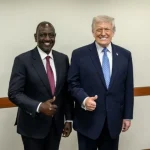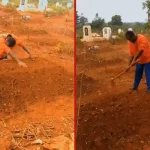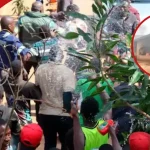Bondo’s Streets Filled With Grief
Bondo, a town deeply tied to Raila Odinga’s political and familial roots, has erupted in sorrow following the reports of his death. Early this morning, residents streamed into the streets, many in traditional mourning clothes, overwhelmed with grief. Their cries of “Jowi! Jowi!” echoed through the neighbourhoods— a collective outpouring of emotion, shock, and loss.
It is a deeply symbolic moment: “Jowi”, a Luo word often used to express pain, lamentation, and emotional distress, now carries the weight of decades of hope, struggle, and political life in one voice.
What “Jowi” Means to the People of Bondo
For many in Bondo, ‘Jowi’ is more than a cry—it’s a ritual of mourning, a verbal drum that summons shared memories. It recalls the funerals of beloved figures, especially within the Odinga family: Fidel Odinga, Jaramogi Oginga Odinga, and others whose losses were marked by traditional mourning, communal gathering, and loud, raw expressions of grief.
In Bondo, the Odinga name isn’t just political; it’s personal. The emotional cadence of “Jowi” reveals a people experiencing not just the loss of a politician, but the possible end of an era.
Scenes from the Ground
Streets plunged into silence, then overwhelmed by wailing, ululations, and children being comforted by elders.
Small groups gathering at market centres, the ODM offices, and near Odinga’s ancestral home, with some carrying photos, others simply waving shawls or handkerchiefs.
Spontaneous dirges break out; Luo songs intertwined with prayers fill the air.
As local shops shut early and motorbikes slow down in respect, the town seems to pause—Bondo is collectively absorbing news that feels as much personal as it is political.
Why the Pain Feels So Deep
Several factors amplify the gravity of this moment in Bondo:
Historical ties: Odinga’s family is deeply embedded in Bondo. His grandfather, Jaramogi Oginga Odinga, is a local legend and freedom fighter, whose mausoleum and legacy live in the area.
Political identity: For many residents, Odinga represented resistance, change, and the voice of the marginalized. This makes his reported passing not just a loss of a leader, but the loss of a cultural and political anchor.
Uncertainty & rumor: While many reports say he died, official confirmation is yet to emerge. This liminal space—between rumor and fact—draws out grief, making the mourning more visceral and the disbelief more intense.
Social Media, Rumors, and Reality
Even as Bondo laments, some are asking for calm and verification. The power of WhatsApp messages, tweets, and viral videos has accelerated both the spread of grief and the spread of potential falsehoods. In times like this:
Emotional resonance makes people believe what they want to be true.
Rumors can spark more trauma when truths are delayed.
Many locals say they want an official statement from Odinga’s family or trusted party officials.
What This Could Mean Going Forward
Political ripple effects: Odinga’s leadership has long shaped opposition politics in Kenya. His absence could shift alliances, strategies, or leave a vacuum in the voices many felt represented them.
Everyone’s mourning: It’s not just party loyalists grieving. Teachers, traders, elders, students — people far from political offices — talk of Odinga not just for what he did, but what he stood for.
Memorials & tributes expected: In coming days, Bondo is likely to see official memorials, cultural ceremonies, mass prayers, and possibly community-organized vigils.
Final Reflection
As dusk settles over Bondo tonight, the cries of “Jowi! Jowi!” still linger in the air — an expression of profound personal and communal loss. Whether this mourning is in reaction to a confirmed loss or part of a collective fear and grief, it reminds all of the fragility of life, the power of hope, and the essential human need to express sorrow together.
In Bondo, they are not just mourning a man—they are mourning an era of expectations, resistance, and a dream of justice. And for now, that mourning is raw, loud, unfiltered.
If you like, I can also write this from the perspective of someone in Bondo, with interviews or imagined voices to make it even more human-interest focused. Do you want me to do that?










